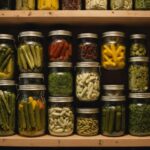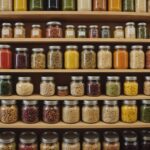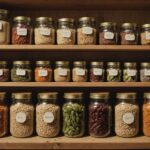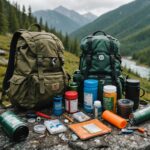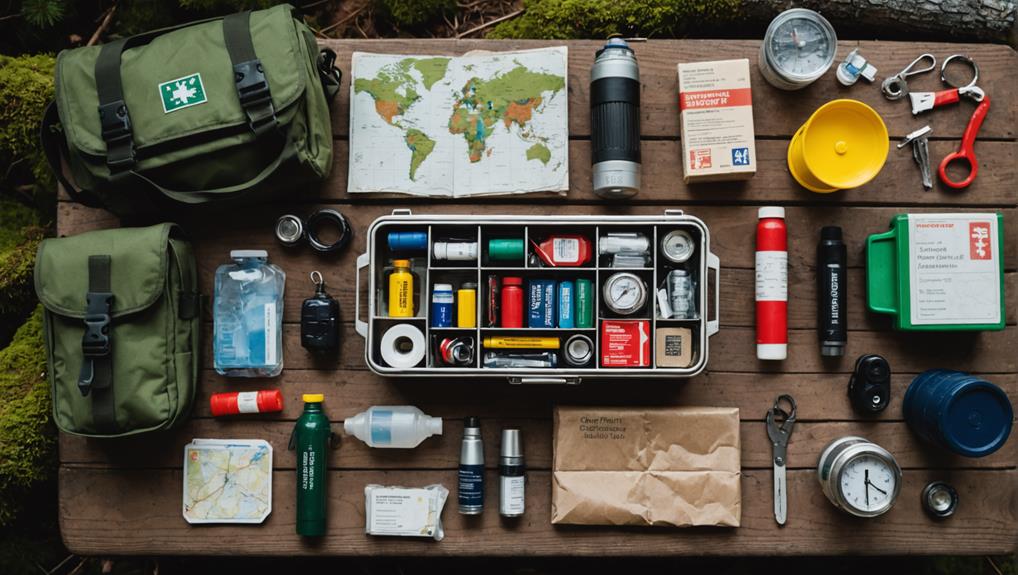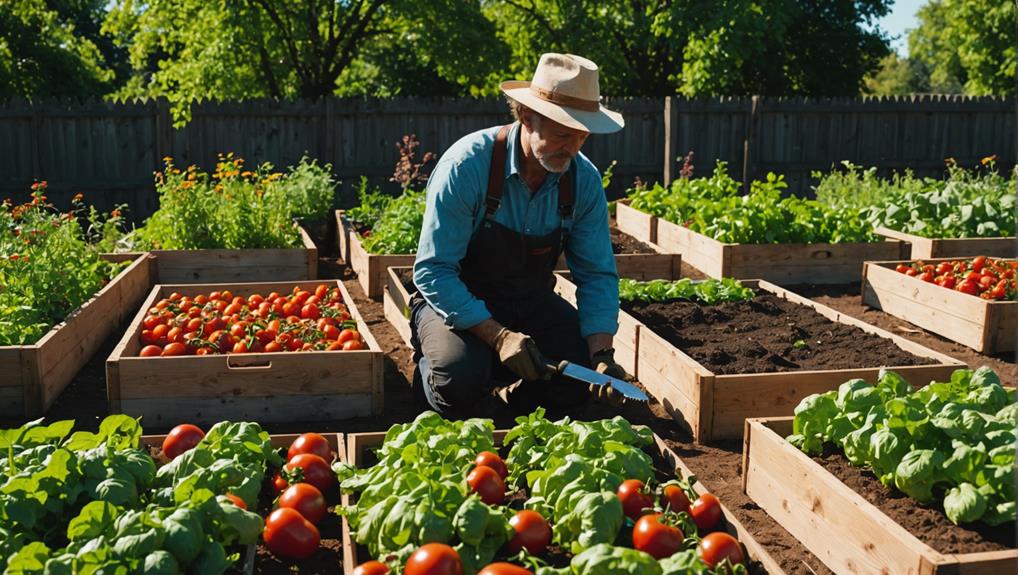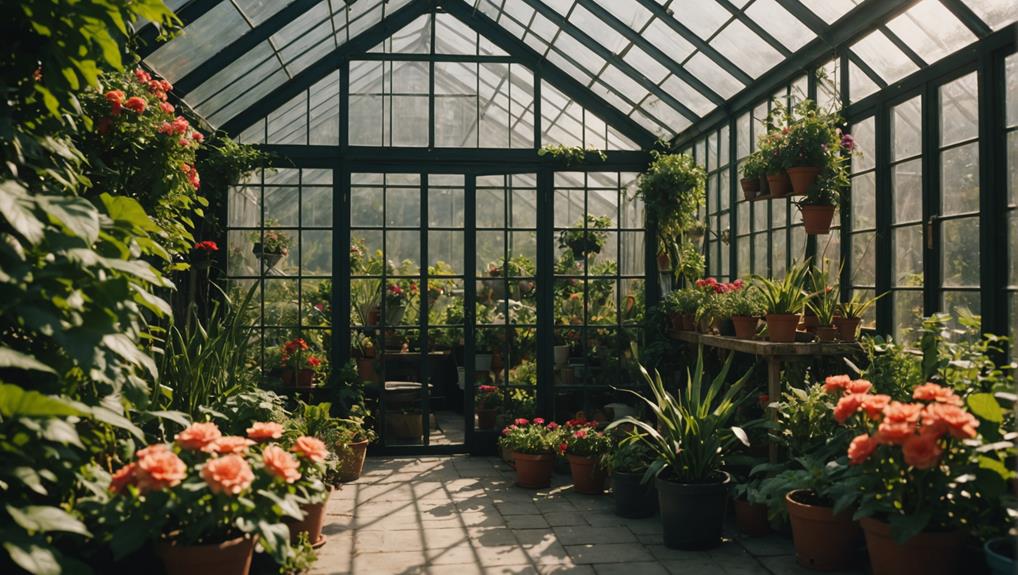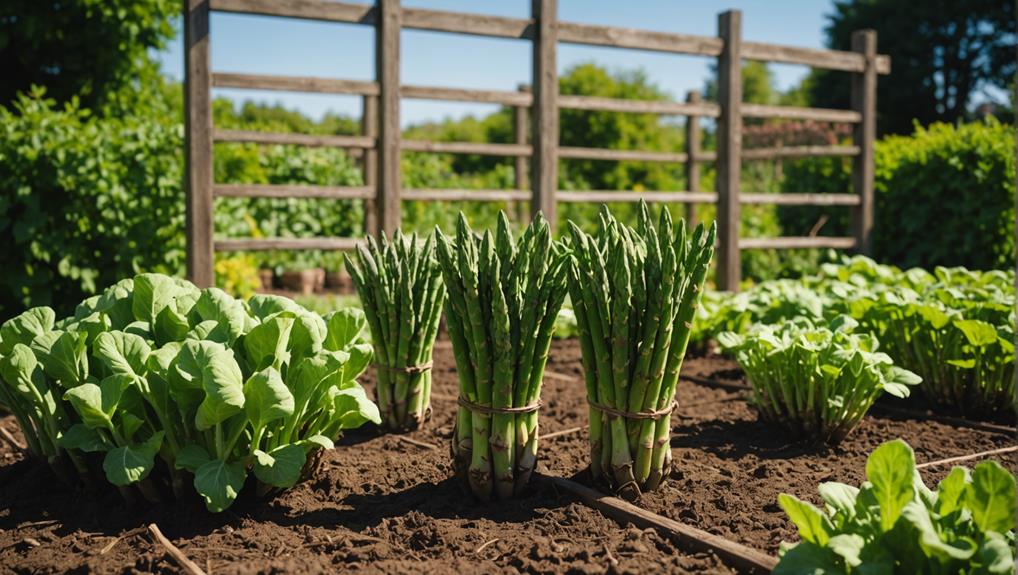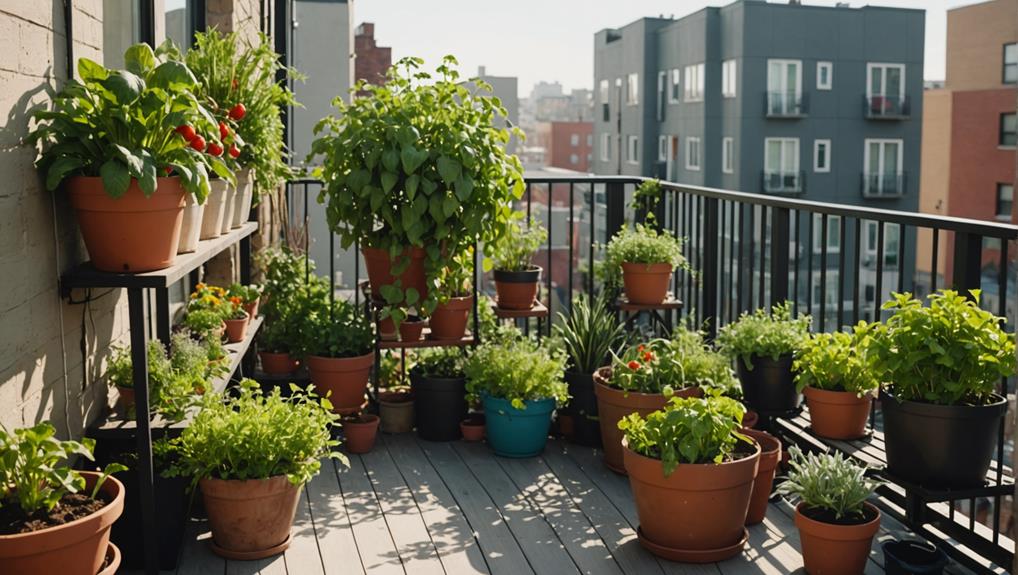As an Amazon Associate I earn from qualifying purchases.
To survive any disaster, you'll need to prepare with essential supplies and a solid plan. Start with at least a gallon of water per person per day, plus non-perishable food for at least two weeks. Don't forget hygiene items and a first aid kit. Having cooking equipment, communication tools like a battery-powered radio, and a protection plan is vital for your safety. Make sure you include sanitary supplies and a way to dispose of waste. These basics will enhance your self-sufficiency. There's much more to cover, so keep exploring what else can help you through tough times.
Importance of Emergency Preparedness
Emergency preparedness is essential because it helps you minimize disruptions and stay resilient when unexpected crises strike. Whether it's a natural disaster, societal unrest, or personal emergencies, having a solid plan in place gives you the freedom to act decisively. You can't wait for a crisis to prepare; instead, adopt proactive strategies that enhance your self-sufficiency.
Start by creating an inventory list of essential supplies you might need—think water, food, first aid, and tools. Don't overlook financial preparedness; over 50% of Americans would struggle with a $500 emergency without credit. This highlights the necessity of a rainy day fund alongside your emergency kit.
When you have everything organized, you're not just reacting; you're ready. This self-sufficient mindset empowers you to face uncertainties with confidence. Millions are already taking these steps, moving away from panic and towards control. By prioritizing emergency preparedness, you're not just protecting yourself; you're embracing a lifestyle that values freedom and resilience. So, get started today and make sure you're equipped for whatever challenges come your way.
Essential Supplies for Survival
When preparing for unexpected disasters, having the right supplies is vital for your survival. You'll need to focus on water storage, food supply essentials, and a well-stocked first aid kit. Let's break down what you should have on hand to guarantee you're ready for any situation.
Water Storage Guidelines
To guarantee you're prepared for a disaster, it is vital to store at least 1 gallon of water per person per day for hydration needs. The minimum recommended supply is three days, but for long-term Emergency Survival, aim for at least 14 gallons per person. Proper water storage is paramount, so consider investing in water storage tanks or food-grade plastic containers to keep your water safe and free from contamination.
Here are some tips to enhance your water supply:
- Use portable water purification tablets or filters like LifeStraws to treat questionable sources.
- Regularly check your stored water and replace it every six months to maintain freshness.
- Collect rainwater whenever possible to supplement your supply.
- Label your containers with the date to keep track of freshness.
Food Supply Essentials
After confirming you have a reliable water supply, it's time to focus on building a food stockpile that will sustain you during a disaster. Start by gathering food supply essentials, aiming for at least two weeks' worth of non-perishable food items. You'll want to guarantee a minimum of 23,000 calories per person to keep your energy up.
Prioritize shelf-stable foods like canned goods, dried beans, rice, and pasta. These foods can last for years when stored properly, making them perfect for your Emergency Food Supply. Don't forget to regularly check expiration dates and rotate stock to keep your supplies fresh.
Include cooking equipment, such as propane camping cookers, so you can prepare meals during power outages or when resources are low. Also, consider stocking up on tradeable goods—items like lighters and hygiene products can be invaluable in barter scenarios during long-term emergencies. By preparing now, you're not just surviving; you're asserting your independence and readiness for whatever challenges may come your way.
First Aid Requirements
A well-stocked first aid kit is vital for addressing injuries and illnesses during a disaster. You'll want to make certain your kit is filled with essential supplies that can help you respond effectively. Regularly check for expired items and replace them to keep everything ready for action. Here's what you should include:
- Bandages: Various sizes for different wounds.
- Antiseptics: To clean and prevent infections.
- Prescription medications: Stock at least a week's supply.
- Feminine hygiene products: Essential for health and comfort.
Having the right items is just part of the equation; you also need to be prepared to use them. Familiarize yourself with basic first aid procedures and get CPR training. This knowledge can be life-saving when every second counts. Remember, your freedom to choose how you prepare is key. By being proactive about your first aid needs, you're taking control of your health and safety in uncertain times. Stay informed, stay trained, and keep your supplies updated. Your preparedness can make all the difference.
Water Storage and Purification
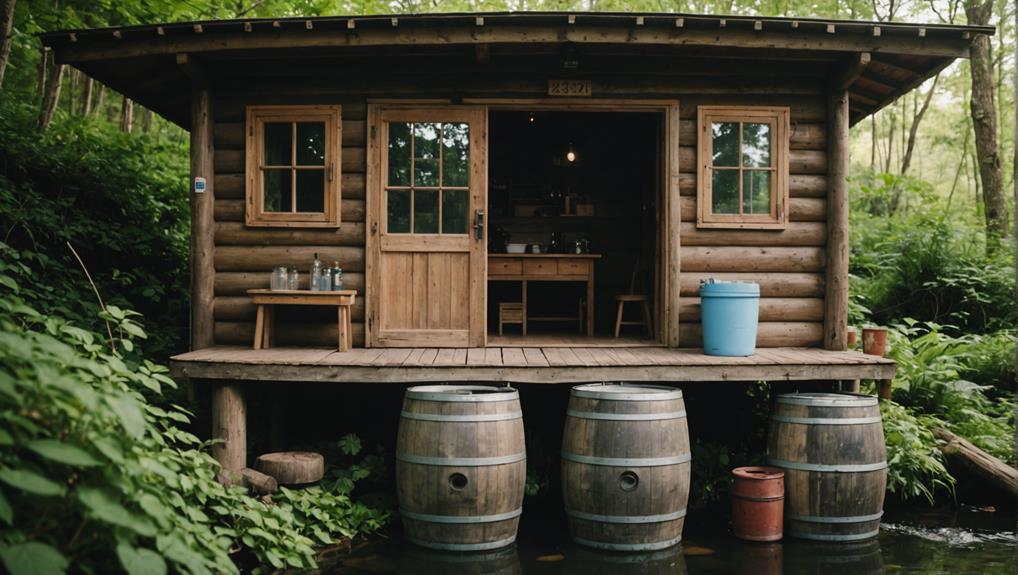
Storing and purifying water is essential for ensuring you have safe drinking supplies during any disaster. To prepare, aim for at least 1 gallon of water per person per day for a minimum of three days, but ideally, stock up for two weeks. Invest in water barrels for bulk storage—these allow you to keep large quantities on hand. Portable jugs are great for easy refills and transportation, giving you flexibility when you need it most.
Don't forget about water purification! Using tablets and portable filters, like LifeStraws, can turn questionable sources into safe drinking water during emergencies. Regularly check your supplies and replace stored water every six months to keep its quality high.
Consider setting up rainwater collection systems as a sustainable way to gather water. This method helps you augment your stored supplies during prolonged emergencies and reduces reliance on external sources. By taking these proactive steps, you empower yourself to face any challenge head-on, ensuring you and your loved ones stay hydrated and healthy when it matters most.
Food and Tradeable Goods
When prepping for disasters, storing non-perishable food is essential, so aim for at least two weeks' worth of supplies. You'll also want to think about tradeable goods, as items like lighters and hygiene products can be valuable in a pinch. Finally, don't forget to include cooking equipment to guarantee you can prepare meals when traditional methods aren't an option.
Non-Perishable Food Storage
Non-perishable food storage is essential for guaranteeing you have enough sustenance during emergencies, so focus on calorie-dense items that can last for years. Preparing with the right emergency food supplies can make a big difference when disaster strikes.
Consider stocking a variety of shelf-stable foods to keep your energy levels up:
- Canned goods (vegetables, beans, meats)
- Dried fruits (raisins, apricots, cranberries)
- Whole grains (rice, quinoa, oats)
- Legumes (lentils, chickpeas, black beans)
Regularly check expiration dates and rotate your stock using a 'first in, first out' system for effective inventory management. This guarantees that you always have fresh non-perishable food when you need it most. Don't forget to include cooking equipment, like propane camping cookers, to prepare your meals during power outages or in challenging situations.
Bartering Essentials
Having a well-prepared stock of food not only sustains you during emergencies but also sets the stage for successful bartering when resources become scarce. To navigate uncertain times, stockpile at least two weeks' worth of non-perishable food items. This will guarantee you have the supplies necessary for both your needs and potential trade opportunities. Regularly check expiration dates and rotate your food stock to maintain freshness, maximizing the value of your tradeable goods.
Consider including versatile tradeable goods in your inventory. Items like lighters, alcohol, hygiene products, and medications can become incredibly valuable in a barter economy. Additionally, having a stock of seeds allows you to grow your own food in the long run, which is invaluable information in a crisis.
Understand local needs and preferences to guarantee you possess items that are in demand during prolonged emergencies. By preparing with these bartering essentials, you not only secure your own survival but also position yourself as a resourceful individual capable of thriving in challenging situations. Embrace this preparation, and you'll find that freedom comes from being self-sufficient and connected to your community in times of need.
Cooking Equipment Necessities
Essential cooking equipment, like portable grills and propane camping cookers, guarantees you can prepare meals even during power outages or emergencies. To confirm you're ready for anything, focus on lightweight and portable tools that make meal preparation a breeze. Here's a list of essentials you should have:
- Portable stove: This allows you to cook wherever you are, using minimal fuel.
- Propane camping cookers: Great for quick meals and easy to set up.
- Pots and pans: Opt for a basic set that's versatile and easy to carry.
- Cooking oil: It's a must for many recipes and can also be a valuable tradeable good.
Having reliable cooking equipment not only keeps you fed but also opens up opportunities for bartering. When crises hit, food becomes essential. So, be prepared with cooking supplies that support your freedom to thrive, even in challenging situations. With the right gear, you'll not only survive but also maintain your independence.
Protection and Self-Defense
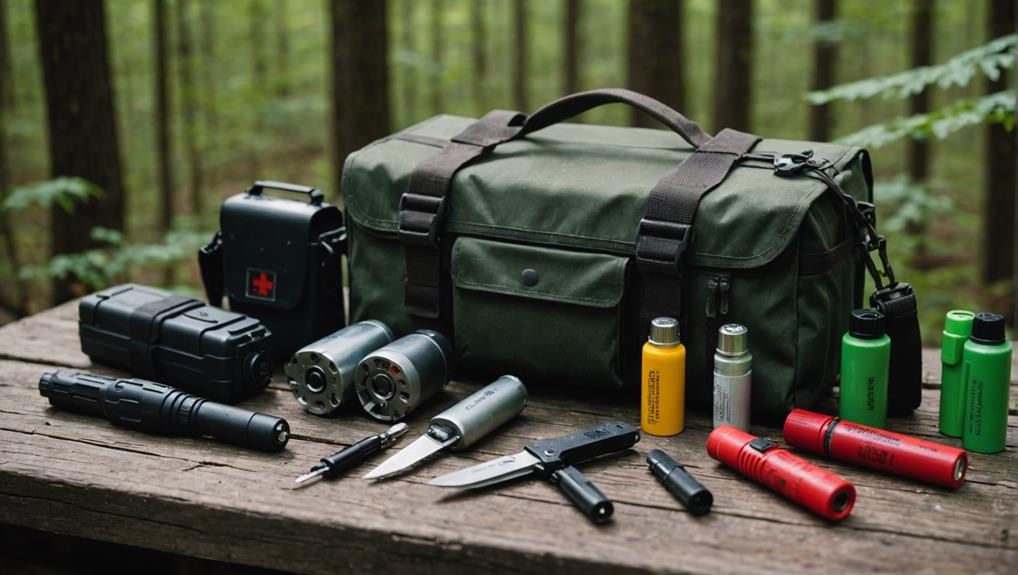
Protection and self-defense are essential components of disaster preparedness, ensuring you and your loved ones can respond effectively to potential threats. Establishing a solid protection plan is necessary; it helps everyone in your family know how to handle dangerous situations, especially during crises when desperate individuals might pose a risk.
Firearms and ammunition are crucial for personal safety. They provide a means of self-defense against potential threats. However, safety should always come first. Investing in biometric gun safes allows you to securely store your firearms while ensuring quick access when needed. This reduces the risk of unauthorized use while maintaining your ability to protect yourself.
For those who prefer non-lethal options, bear spray can be an effective tool against aggressive individuals or wildlife without resorting to firearms. Remember, during prolonged crises, ammunition can become a valuable trade item, making it essential to manage your supplies wisely.
Ultimately, being prepared for any scenario means having a clear protection strategy and the right tools at your disposal. Whether through firearms or non-lethal means, your ability to defend yourself can make all the difference when it matters most.
Communication and Signaling Tools
Effective communication during disasters can be a lifesaver, so equipping yourself with reliable signaling tools is vital. When the unexpected strikes, you need to guarantee you can reach out for help or receive critical information. Here are some must-have tools for effective communication:
- Battery-powered or hand-crank radios: Stay updated on news and emergency alerts when traditional systems fail.
- Whistles: These simple tools require no power and can effectively signal for help.
- Cell phone with backup charger: This keeps your communication lines open during a power outage or disaster.
- Emergency contact list: Keep this handy, including vital phone numbers and addresses to aid in communication efforts.
Hygiene and Sanitation Essentials
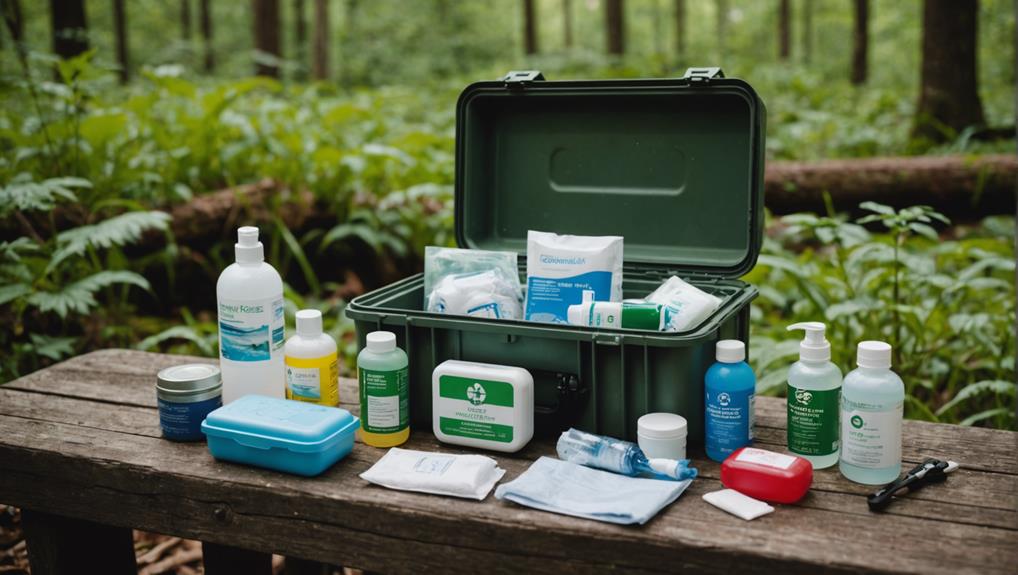
Maintaining hygiene and sanitation during a disaster is fundamental for your health and safety. You can't afford to neglect personal hygiene when conditions get tough. Stock up on items like soap, toothbrushes, and toothpaste to keep yourself clean and minimize disease risk. If water's limited, include moist towelettes in your kit as an effective cleaning solution.
A portable toilet can be a game changer when traditional facilities aren't available, providing a sanitary option that enhances your hygiene. Don't forget the importance of waste disposal; trash bags are essential for keeping your living area clean and reducing illness risks.
To guarantee safe drinking water, make sure you have water purification tablets on hand. Staying hydrated is crucial, and it's just as important to confirm that water is safe to consume.
Lastly, keep a stock of sanitary supplies like feminine hygiene products, which are often overlooked but necessary during emergencies. With these hygiene and sanitation essentials in your preparedness plan, you empower yourself to face any disaster with confidence and resilience.
Frequently Asked Questions
What Are the 10 Essential Survival Kit Items?
When building your survival kit, include first aid supplies, emergency food, water purification, fire starting tools, shelter options, survival gear, navigation aids, and communication devices. These essentials guarantee you're prepared for any situation that arises.
What Do You Need to Prep for a Disaster?
To prep for a disaster, you need emergency communication tools, food storage, water purification methods, first aid supplies, shelter options, self-defense strategies, and mental resilience. Long-term planning keeps you ready for anything life throws at you.
What Are the 5 Important Elements of Disaster Preparedness?
When preparing for disasters, you need emergency plans, food storage, and first aid supplies. Don't overlook communication strategies, community resources, evacuation routes, and training drills to build mental resilience and guarantee your freedom during crises.
What Are the Essentials for Preppers?
For preppers, essentials include water purification, food storage, and emergency shelter. Don't forget first aid supplies, self-defense tools, communication devices, fire starting gear, and navigation skills to guarantee your independence in any situation.
Conclusion
In any disaster, being prepared can make all the difference. By gathering essential supplies, securing water and food, and ensuring you have protection and communication tools, you're setting yourself up for success. Don't forget hygiene essentials to keep yourself healthy. Remember, it's not just about surviving; it's about thriving in tough times. So take action now, and get your emergency plan in place. You'll feel more confident knowing you're ready for whatever comes your way.
As an Amazon Associate I earn from qualifying purchases.





